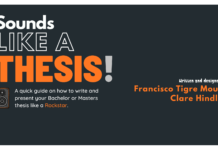The first time I was aware of the “3 Minute Research Competitions” was in 2009. I had just arrived at the University of Otago (New Zealand) to start my PhD and one of my colleagues had qualified for the final. She would have to present her work in one of the large classrooms for an audience of nearly 250 people.
The event was incredible and truly inspiring.
Packed audience, participants from various courses and departments, and many insightful presentations. After an hour, I learnt about birds, blood cells, genes, architecture, leadership and much more. And very importantly, I was informed by passionate people about their topics.
In the following years I always participated and took away a lot from the experience.
Format Of The Event
“3 Minute Research Competitions” are a widely known format where students present their studies under a restricting scenario: The participant, usually, only has 1 slide (without animation) and 3 minutes precisely timed to present their research. Furthermore, students must not have any hand notes during the presentation.
Presentations are also normally evaluated by a panel of professors from various departments. Among many factors, the panel judges presenters on:
- Delivery of content
- Creativity and suitability of slide
- Relevance and theoretical contribution of the study
The event can be organized for students in any study level: Bachelor, Master or PhD. Moreover, students can be in any stage of their research process. For example:
- Research idea: Students present the foundation for a research question, raising thus the importance of the study and potentially an initial indication of how the study will be conducted.
- Research question and methodology: Students present the core theoretical foundation that led to the research question and the methodology employed. Usually the participant is at the data collection stage and may discuss predictions of findings.
- Research question, methodology and findings: Here students have already completed their study and are able to discuss findings, conclusions and suggest future research directions.
For the audience, it is a wonderful opportunity for three main things: To have fun, learn and feel inspired.
Prizes and Awards
In the end, there are usually two awards: Panel Award and Audience Award. The panel award is made based on the description above, while the audience is purely subjective and done through democratic voting. So make sure to invite friends and family members! Always helps.
The prizes also vary according to the institution. Some universities have sponsorship from companies that give away products, vouchers or even money. And at times, the prize is paid by the university.
How To Succeed on a “3 Minute Research Competition”
The main point students should keep in mind is:
Your main goal is to communicate your work for a heterogeneous audience in a fun, easy to understand and exciting way.
You will always have people in the audience that are not familiar with your topic and do not know even the very basics of your field. However, they must be able to understand everything you are doing.
Therefore, you must convey your message in a way that EVERYONE can understand, irrespective of his or her field of expertise. This is of great importance.
Thus, I would recommend the following:
1. Inspire
The way you deliver your idea is very important. No one wants to see a boring presentation, right? So remember that it is your chance to show others your passion for your topic. Your body language is very important, so: smile, gesticulate, keep your posture, and let others feel why your topic is so interesting for you. They will feel it and it will resonate with them!
In order to do that rehearsing is very important:
- Practice in front of the mirror
- Observe your facial expressions
- Keep track of time. You only have 3 minutes!
- Memorize your speech perfectly
- Test it with friends and family and ask for feedback
- Be yourself! If you are a funny person, be this way. If you are a shy/serious person don’t go out of your way to try to be someone else.
A great deal of inspiration comes down to the slide you develop. Your slide will create an important initial impression in the audience and is a strong factor differentiating presenters.
Here are some suggestions for it to be FUN and INFORMATIVE:
- Have a centralized title on the top of the slide (The audience might forget what your topic is).
- Avoid a clustered slide (e.g. avoid too many terms and have no long sentences)
- Consider using humor (e.g. funny photo, example or text) without losing credibility of the content
- Have great images and check for their resolution
- Avoid old-fashioned fonts.
Here are two inspiring examples from the University of New South Wales:
2. Inform
Present the fascinating side of your topic. Blow the audience away with eye-catching facts, bring some funny examples or analogies and inform them about the innovative findings in your field.
Always remember: after your three minutes, is the audience LEARNING something from you? If the answer is NO, go back and work on your speech.
In order to do that:
- Write your speech carefully and consider a logical structure:
- Short introduction
- Short development and description
- End with a “hook” sentence
- Don’t waste time introducing yourself or thanking others
- Consider starting your speech with a question. It always helps to draw attention from the crowd. However, do not wait for an audience response to your question as it can reduce your time.
- For example: “Did you know that it is really hard to differentiate the gender of frogs”?
- Use analogies, if needed. Analogies always helps the understanding and can be quite funny!
- Include short interesting examples
- Make clear the RELEVANCE of your study or topic
- Finish with a “hook” sentence
Once you finish writing your speech, review the three most important questions:
- Can everyone in the audience, irrespective of his or her field of expertise, understand your study?
- Is the audience learning something they did not know before?
- Was it fun and interesting?
If the answer to those questions is YES, you are on your way to a great presentation.
Suggestions For Organizers
For the past year and a half, together with my dear friend and colleague Prof. Dr. Clare Hindley, I have organized the event at the university where I currently work (IUBH University of Applied Sciences – Germany). The impact it has had on the students that have participated and on the audience that has attended has been incredible and I certainly recommend all universities and colleges to do the same.

The feedback from students in the audience is usually the same every semester: “I loved it and if I had known it was so interesting and fun I would have joined”!
Slowly the buzz surrounding the event has increased, the level of presentations has improved and we are very optimistic it will be an exciting regular event on campus. Hopefully this will also reflect on the interest of students in research.
For scholars intending to organize it, I would suggest the following:
- Create an engaging and supportive event. Students must not fear it, but rather be thrilled by it. Questions and feedback from the panel must not “grill” participants, but rather trigger interesting debates and thoughts.
- Make it fun for everyone. Have fun background music before the event, during the break and after the event.
- Film and share it. Students appreciate having their work shared with the world and it will help inspire others and promote your institution.
- Have appealing awards. At IUBH, we present winners mini iPads, certificates for all participants and an extra certificate for the “panel” and “audience” winners.
- Engage students to promote the event. It is certainly much more effective than only staff promoting it.
Final Thoughts
Hopefully these tips are useful for you, regardless of whether you are a student or staff. And let’s try to use this event format to spread inspiring ideas and motivate even more students to develop exciting research!




